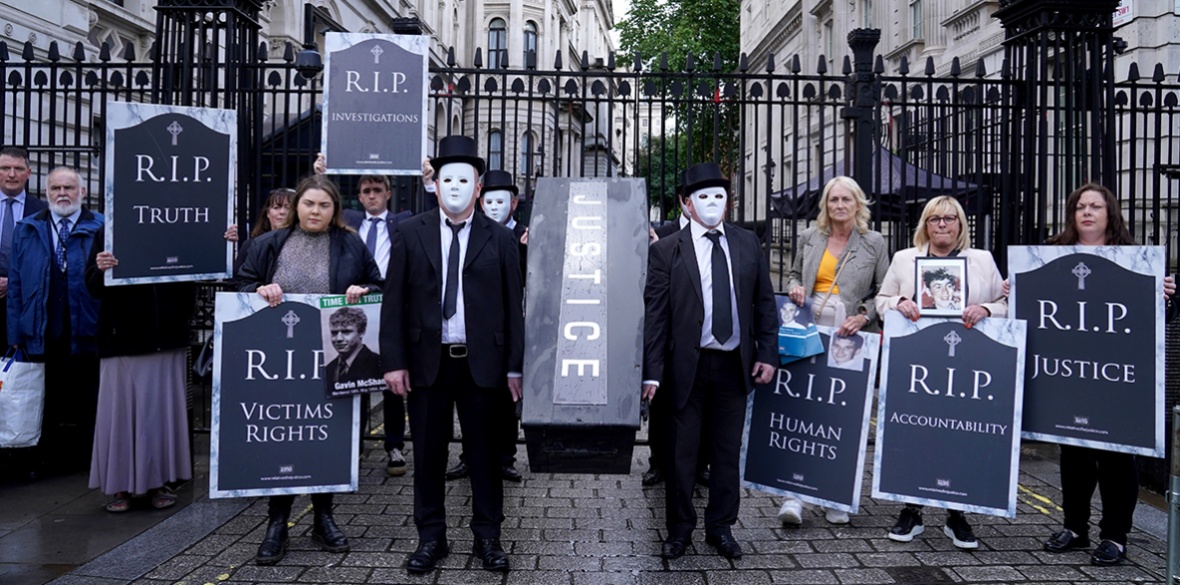This is the last article you can read this month
You can read more article this month
You can read more articles this month
Sorry your limit is up for this month
Reset on:
Please help support the Morning Star by subscribing here
THERE are an estimated 3,500 deaths arising from what is known as the Troubles.
More than half of them were civilians. About one third of them were members of the security forces and about one sixth of them were from various paramilitary groups.
Of course the number of people seriously injured is also very high. And the number of lives blighted by the loss of a friend or loved one is far greater.
When there is there is death and grief on such a scale, it is incumbent on any government to treat the issues of justice and reconciliation with the utmost care and sensitivity. This Bill shows this government failing in its duty on a series of fronts.
The first duty was to consult properly and effectively. In particular, victims’ groups have expressed their deep unhappiness at the provisions of this Bill. If they feel let down, the government has by definition failed those who gave so much.
The Secretary of State has claimed that victims’ support groups privately back his proposals.
As reported in the Belfast Telegraph just yesterday, the three main victims’ support group have publicly declared that they emphatically do not support these proposals.
The government has also failed to consult effectively with the government of the Irish Republic.
The spirit of the Good Friday Agreement is that communities must work together, that there must be North-South co-operation and that there must be East-West co-operation, meaning between London and Dublin.
The Irish Foreign Minister Simon Coveney was unequivocal. He said that “it is disappointing that the UK government have chosen to unilaterally introduce legislation, when our starting point was the need for an agreement to be reached between both governments and the parties, and with the needs of victims and survivors at the heart of the process.”
The government is making a habit of this, of course. They are unilaterally trying to rip up the Northern Ireland Protocol too, in complete abrogation of international law and international obligations.
The issues of justice and of reconciliation should have been paramount. In South Africa, Human Rights Watch estimated there were over 8,500 deaths in the struggle against apartheid, a far greater death toll.
They established the highly successful Truth and Reconciliation Commission, which brought a measure of justice to the necessary process of reconciliation. This government could have learnt from that process, but they failed to do so.
It is clear that this government previously attempted to extend an amnesty for State forces involved in crimes including torture and murder.
It is unclear from this extremely long Bill that the government is not attempting to do the same thing by other means.
That is an effective amnesty for those who are deemed to be on the right side of the conflict, prosecution for those who are not.
The Secretary of State has told us that “the Independent Commission for Reconciliation and Information Recovery will grant immunity from prosecution, based on an individual’s co-operation with the body’s inquiries.
“Those who do not co-operate with the independent body will not be granted immunity and will remain liable to prosecution.”
But the issue here is precisely independence and therefore fairness and justice.
I am afraid to say that for people in Ireland, the appointment of a judge by any British government and not an independent panel with open hearings does not satisfy that requirement.
People in Ireland remember judges such as Lord Widgery and the whitewash of the original Bloody Sunday inquiry.
Or Lord Lane of St Ippollitts who dismissed the appeal of the innocent Birmingham Six out of hand.
Or Lord Diplock who gave his name to the notorious, no-jury courts that rubber-stamped the prosecutions of the discredited and disbanded RUC.
I cast no aspersions on any individual, particularly those who can no longer defend themselves. But if justice is done it must be seen to be done. And there are many people in Ireland and beyond who will not see the appointment of a British judge as a guarantor of independence or impartiality.
Instead, there is a real risk that the government is still aiming to achieve immunity from prosecution for members of the state forces, who will have been deemed to co-operate, and prosecutions for others who are ruled to have been unco-operative.
Meanwhile, surviving victims or the bereaved do not get the justice they have a right to demand.
The government needs to go away and think again. It needs to engage in genuinely wide consultation, it needs to listen to all our partners in the peace process and it needs above all to listen to representatives of the victims.
The Northern Ireland Troubles (Legacy and Reconciliation) Bill passed its second reading in Parliament this week (285 to 208, majority 77) without support from any of Northern Ireland’s MPs.
Diane Abbott is MP for Hackney North and Stoke Newington.











